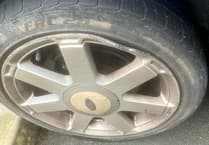A deadly disease that kills ash trees could decimate Devon’s second most popular species of tree and change the county’s landscape, warned a county Councillor this week.
Describing the news as “very bad” Cllr Roger Croad told the Ivybridge Town Council meeting that chalara or ash dieback is continuing its inexorable spread across the UK. The airborne fungus, which was first discovered in Kent, has recently been found in two areas of Devon - Totnes and Bickleigh - resulting in trees being felled for safety reasons.
There is no cure for the disease, which is highly infectious. Cllr Croad said: “We haven’t yet come across an ash tree that is resistant to it.”
This week, DCC agreed a plan to manage the risks posed by the disease. It is aiming to increase the frequency of tree inspections, initially to every two years, to minimise the danger of falling trees and branches.
Devon stands to lose around 20 per cent of its trees. Ash dieback could have a particularly devastating impact on our county’s hedgerows as Ash is one of the main hedgerow trees, along with oak and beech. DCC estimates that it makes up around 16 per cent of shrubby growth. Its website states: “If the ash goes, and evidence from the continent suggest we will lose 90 per cent of them, then our landscape will change dramatically.”
Cllr Stuart Hughes, DCC cabinet member for highway management, said: “Ash dieback represents a serious threat to Devon’s environment as well as being a threat to public safety. The nature of Devon’s highways network with a high proportion of hedgerow trees, many of which are ash, means that the impact on public safety could be greater than for some authorities where the disease is more advanced.
“It is important that we make appropriate provision financially and take action to ensure public safety at the appropriate time. As the disease progresses over the next few years this will need to be monitored and reviewed.”
The disease could wipe out all species of ash trees, including our native ash, Fraxinus excelsior. Ash trees are present in parks and gardens, as well as in native woodlands. DCC surveys from 2013 suggest there are 6,300 ash trees on highway land, 3,900 on DCC land, 3,100 within school grounds and 440,000 within falling impact of a highway.
To try and slow the spread of the disease the import and movement of ash seeds, plans and trees has been prohibited in the UK since October 2013. Legally enforceable action can be taken to control the spread of the fungus where it is found.
Cllr Croad said: “To fell all of the ash trees that might affect the highway in the county could cost more than £70m.”
Landowners are responsible for ensuring that trees on their property do not represent a risk to the public and are encouraged to have them regularly inspected. If DCC is made aware of dangerous private trees near the highway, it will issue a notice to landowners. If they fail to act on such a notice the council may carry out the work and recharge the landowner.
Devon has established the Devon Ash Dieback Resilience Forum with key stakeholders as a proactive response to the ash tree crisis.
The council’s cabinet has also supported measures to mitigate the impact of Ash dieback, including immediate action to replace trees that are lost and planting of a diverse range of tree types to develop a more resilient landscape which can cope with future tree pests and diseases. It will be adopting the a formula where at least three new trees should replace each large tree lost, two for a medium tree and one for a small tree.
For more information visit: https://new.devon.gov.uk/environment/wildlife/invasives-and-disease/ash-dieback
A map showing the spread of the disease can be found at: http://chalaramap.fera.defra.gov.uk




